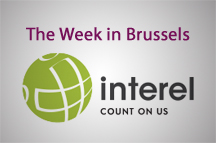 Bringing Europe into the digital age was the key theme of the week with the unveiling of a series of much-hyped plans to create a Digital Single Market (DSM 2). Unlocking the potential of European tech companies has been a major plank of Jean-Claude Juncker’s ten priorities and the Commission claims this can add another €415 billion each year to the EU’s economy. The main headline was addressing the problem of geo-blocking, where consumers are prevented from buying goods online across borders. Vicky Ford, Tory Chairwoman of the Internal Market Committee which will deal with most of these proposals, warned that this risked hurting small companies that could not deliver across all 28 countries and she was equally scathing about the plans to force online video companies like Netflix to carry at least 20% European content. On the other hand, Julia Reda, from the German Pirate’s party, complained that the proposals did not go far enough and had already been watered down by powerful national interests and corporate lobbying. She pointed out that consumers can still be blocked from buying e-books or music from on-line sellers in other countries and these more sensitive issues have been left to further proposals due in the autumn. The debate has clearly only just started but looks like being intense.
Bringing Europe into the digital age was the key theme of the week with the unveiling of a series of much-hyped plans to create a Digital Single Market (DSM 2). Unlocking the potential of European tech companies has been a major plank of Jean-Claude Juncker’s ten priorities and the Commission claims this can add another €415 billion each year to the EU’s economy. The main headline was addressing the problem of geo-blocking, where consumers are prevented from buying goods online across borders. Vicky Ford, Tory Chairwoman of the Internal Market Committee which will deal with most of these proposals, warned that this risked hurting small companies that could not deliver across all 28 countries and she was equally scathing about the plans to force online video companies like Netflix to carry at least 20% European content. On the other hand, Julia Reda, from the German Pirate’s party, complained that the proposals did not go far enough and had already been watered down by powerful national interests and corporate lobbying. She pointed out that consumers can still be blocked from buying e-books or music from on-line sellers in other countries and these more sensitive issues have been left to further proposals due in the autumn. The debate has clearly only just started but looks like being intense.
Royal blessing for Remain campaign
 The Dutch king Willem-Alexander addressed the European Parliament this week and added his voice to those calling for Britain to stay in the EU. He gave this floral tribute to the EU project: “The European bouquet is not complete without the Spanish carnation, the Croation iris, the Dutch tulip … and the English rose”. He could have added the Scottish thistle as Gordon Brown was also in town, trying to swing the Brexit debate in the same way he was credited with influencing the Scottish referendum. His target was wavering Labour voters and he wanted to present a positive agenda, not just to convince them to vote on June 23 but to be “in the vanguard of the next stage of Europe’s development ... in short, we should be leading Europe, not leaving it”. If the UK did vote to leave the EU the withdrawal would be “long and painful” according to an article by former Liberal MEP Andrew Duff writing in the Parliament magazine. He pictured the European Council meeting the week after a vote to leave where ”there will be many regrets but little patience and great anxiety. The imperative will be to minimise the collateral damage done by the secession to the remaining union, and to prevent contagion of the British disease”. He goes on to predict that the 73 British MEPs and Commissioner Lord Hill could be looking for new jobs as early as July 2018!
The Dutch king Willem-Alexander addressed the European Parliament this week and added his voice to those calling for Britain to stay in the EU. He gave this floral tribute to the EU project: “The European bouquet is not complete without the Spanish carnation, the Croation iris, the Dutch tulip … and the English rose”. He could have added the Scottish thistle as Gordon Brown was also in town, trying to swing the Brexit debate in the same way he was credited with influencing the Scottish referendum. His target was wavering Labour voters and he wanted to present a positive agenda, not just to convince them to vote on June 23 but to be “in the vanguard of the next stage of Europe’s development ... in short, we should be leading Europe, not leaving it”. If the UK did vote to leave the EU the withdrawal would be “long and painful” according to an article by former Liberal MEP Andrew Duff writing in the Parliament magazine. He pictured the European Council meeting the week after a vote to leave where ”there will be many regrets but little patience and great anxiety. The imperative will be to minimise the collateral damage done by the secession to the remaining union, and to prevent contagion of the British disease”. He goes on to predict that the 73 British MEPs and Commissioner Lord Hill could be looking for new jobs as early as July 2018!














